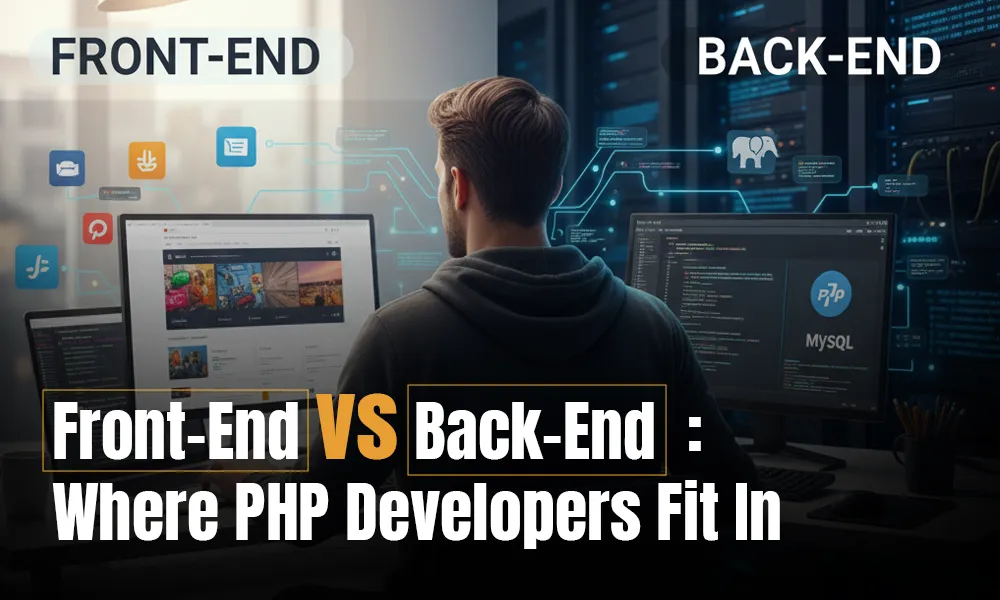1. PHP Developers: The Quiet Cartographers
Behind the scenes, the internet is a very different beast from what it seems on the outside. There’s a constant tug of war going on between visibility and structure, performance and presentation, aesthetics and functionality. Every modern website or application is born at the crossroads of this tension, held together by lines of code. And charting a course through the jungle of logic and layout are the PHP developers, hailed as the quiet cartographers of the tech world. No wonder, the desire to hire offshore PHP developers is still strong among businesses who want to leave their mark as drivers and ushers of new ideas in the business world.
But there’s always this question being thrown around on Reddit and Discord about PHP developers: Where do they fit in? As frontend developers? As backend developers? And then bootstrapped companies—in a bid to save costs—often wonder, “Do we just hire a frontend developer or go with a PHP developer instead?” Phew, all these questions would scramble anyone’s brain cells! But we aren’t here to do that, are we? Why don’t you grab your reading glasses and get reading?
2. The Two Faces of the Web: Front-End and Back-End
Imagine a theatre for a minute.
The frontend is everything the audience sees: the stage, the actors, the costumes, the lighting. Compare it to the user interface of a webpage or web-based app, crafted with HTML, CSS, JavaScript, and modern frameworks like React or Vue. This is where UI/UX designers and developers breathe life into pixels.
You guessed it right: the backend is the backstage, where the set pieces move, the dialogue cues and props are arranged, and the logic of the story really unfolds. Now compare it to a webpage or app once more. Understand that behind the fancy user interface, a modern webpage or app is all code, written with languages like Python, Ruby, Node.js, and yes—PHP. This is where databases live, servers communicate, and APIs connect.
To hire frontend developers is to invest in aesthetics, accessibility, and engagement. To build a team of backend developers is to sculpt the logic, performance, and data integrity that hold it all together.
And yet, somewhere between these two realms walks the PHP developer. Not quite stagehand, not quite performer. But something elemental to both. Someone who is essential to both the frontend and backend games.
3. The PHP Mythos: A Language That Refuses to Die

In a tech world addicted to the shiny and new, PHP is a survivor. Since its humble beginnings in the mid-90s as a simple tool for creating dynamic web pages, PHP has evolved into a robust server-side scripting language powering nearly 77% of all websites today, including WordPress, Facebook (in its early days), and Slack.
It’s fashionable to critique PHP, to dismiss it as outdated, inelegant, or redundant. But the truth is that PHP has matured quietly, away from the headlines. With modern frameworks like Laravel, it has become a clean, elegant, and powerful tool in the hands of those who know how to wield it.
At Remote Resource, we’ve seen firsthand how the right PHP developers can transform outdated systems, build new infrastructures, and drive agile backend logic without overengineering.
4. PHP Developers: Anchored in the Back-End, Fluent in the Front
So, where exactly do PHP developers fit?
4.1. The Backbone of Dynamic Content
At its core, PHP is a server-side language, which places it squarely in the back-end domain. It handles data processing, form submissions, session management, and integration with databases like MySQL or MariaDB.
If your application needs to dynamically serve content to users—personalized dashboards, member portals, eCommerce systems—PHP is not just adequate. It’s efficient, battle-tested, and cost-effective.
4.2. Masters of the Full Stack
Many PHP developers are full-stack by necessity. Why? Because they often work closely with HTML, CSS, and JavaScript, especially when maintaining or building CMS-based websites like WordPress, Drupal, or Joomla.
They may not be React wizards or Vue artisans, but they know how to blend back-end logic with front-end output, and that makes them an invaluable bridge when teams are lean or resources limited.
When startups come to Remote Resource to hire frontend developers and backend architects separately, we often recommend that they hire an offshore PHP developer who can wear both hats. Not only is it cost-effective, but it’s pragmatic in fast-paced build cycles.
5. When to Hire Frontend Developers vs. PHP Developers
It’s the “to be or not to be” question of the tech world.
There are cases where specialized front-end developers are irreplaceable. If you’re building a SaaS dashboard, a mobile-first web app, or a pixel-perfect marketing site with animations and transitions, hire frontend developers who truly understand design systems, accessibility, and responsiveness.
But if your website or product’s front-end is relatively straightforward and your needs lean toward custom CMS logic, eCommerce features, or backend-heavy workflows, then a PHP developer might serve you better, or at least be the backbone that keeps it all together.
Sometimes, a hybrid approach wins: a strong front-end developer working alongside a PHP developer who manages data integrity, server logic, and integrations.
6. The Offshore Edge: Why Remote PHP Talent Works

When companies are fixing to hire frontend or backend developers, what they are looking for in their potential hire is
- Reliability,
- Experience, and
- The ability to execute without friction.
That’s where hiring offshore PHP developers is always a safe bet.
With a staff augmentation partner like Remote Resource, businesses gain access to rigorously vetted, experienced PHP developers who can jump into projects with minimal ramp-up time. They’re not freelancers hunting gigs. They are embedded professionals who understand long-term project architecture and support.
And then you also got to ask yourself, “Why should I hire locally at 2x the cost when I can build a lean, expert PHP team offshore, without compromising on quality, communication, or output?”
7. PHP’s Role in Modern Development Teams
We really need to stop asking whether PHP developers are “relevant.” That’s a hackneyed question.
Instead, we need to ask: What does this project need to succeed?
If the answer includes:
- A database-driven application
- A custom CMS
- Seamless user account systems
- Secure data handling
- API integrations
- Cost-effective server logic
Then, PHP developers are the most essential hire.
At Remote Resource, we don’t pitch PHP as a relic from the past. We pitch it as what it truly is: a language that’s matured quietly, evolving to power millions of sites with grace, speed, and flexibility. In the right hands, it’s the perfect foundation for scalable, smart web development.
8. Beyond the Binary
The real question isn’t “front-end or back-end?” It’s “What kind of developer do I need to build what I envision?”
Sometimes the answer is cleanly divided. Other times, it’s a blur.
So, whether you’re looking to hire frontend developers for a sleek UI, build a robust backend infrastructure, or simply need someone who knows how to tie both worlds together, look again at the PHP developer.
They might just be the cornerstone you didn’t know you needed.



